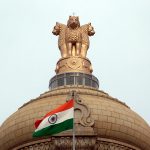The country witnessed mass violence, protests, bandhs, deaths and arrests in the last few days by the Dalit community, subsequent to the Supreme Court’s orders for diluting the provisions of the SC/ST Act.
These guidelines of the act were meant to safeguard the interests of the underprivileged communities against discrimination and atrocities by other higher communities.
The NDA government filed a petition seeking review of the Supreme Court as it holds that the order will diminish the dynamism of the act, thus resulting in the maltreatment of the Dalits.
As per the recent amendment to the Act, now the public servants cannot be prosecuted without the consent of the appointing authority and private citizens too can be arrested only after an inquiry by the law. The court suspended immediate arrests and registration of criminal cases under the SC/ST Act to safeguard the interests of the innocent and further eliminating the opportunity to terrorise the innocent.
The Supreme Court refused to stay SC/ST order and said that the amendment in no ways dilutes the provisions of the SC/ST Act, however, it only restate the law of arrest.
The directive of the amendment was to protect public servants from being blackmailed with false charges while performing their duties faithfully.
Coupled with this, the court said, that there was no “absolute bar against grant of anticipatory bail in cases under the Atrocities Act if no prima facie case is made out or where on judicial scrutiny the complaint is found to be prima facie mala fide”.
Here’s all we need to know about SC/ST Act?
•The Scheduled Castes and Tribes (Prevention of Atrocities) Act or the SC/ST Act, was enacted on September 9, 1989. The rules for the Act were notified on March 31, 1995.
•The SC/ST Act states 22 offences which seek to abuse the self-respect and esteem of the scheduled castes and tribes community. This includes denial of economic, democratic and social rights, discrimination, exploitation and abuse of the legal process. The enactment of any of the above offence is punishable by the law.
•According to the SC/ST Act, protection is provided from restraining these communities from access to a certain place or to use common passages, practising untouchability, maltreating or showing inhuman behaviour.
•Objectives of the Act clearly emphasize the intention of the Government to deliver justice to these communities through proactive efforts to enable them to live in a society with dignity and self-esteem and without fear or violence or suppression from the dominant castes.
But the Supreme Court abides that the latest amendment would not hamper the interest and integrity of the Dalits in the society.
While the Dalits carried mass violence over past few days and called for Bharat Bandh to protest against the Supreme Court’s ruling on the SC/ST Act.
Saanya Jain











